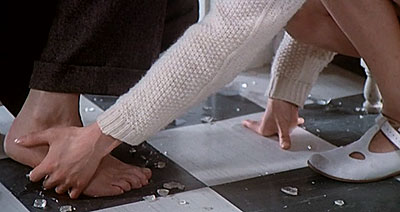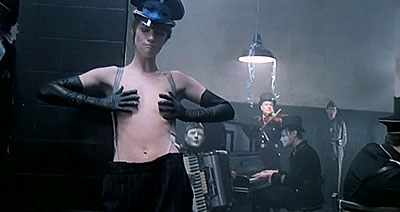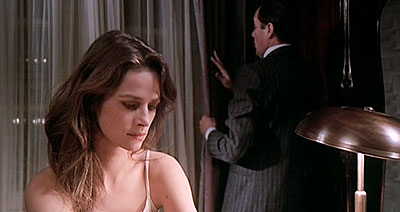Homesick For Sadness: The Night Porter
Published on December 5th, 2011 in: Dancing Ourselves Into The Tomb, Issues, Movie Reviews, Movies, Teh Sex, Underground/Cult |
As a film exploring the sadomasochistic relationship between a former Nazi officer and a concentration camp survivor, The Night Porter has received its share of controversy. In an article about The Night Porter called “Ideas of Sex,” writer and film scholar Nick Impey describes how its “detractors accused [director Liliana] Cavani of exploitatively using the Holocaust as a backdrop for salacious spectacle.” At times, watching The Night Porter feels less like an erotic journey than a particularly gore-free horror movie. It is frequently almost difficult to watch. Yet, persistence provides evidence that The Night Porter is not “Nazi porn” but an examination of the grey areas in a black and white world.
As Max, Dirk Bogarde first comes across as less sinister than petulant. Even his shock at seeing an attractive woman whom he obviously recognizes (Lucia, played by Charlotte Rampling) is in sharp contrast to her terrified response. He simply stands behind the desk, staring, and then has trouble remembering the room number of a guest. Even after being deep in thought, he doesn’t seem too obviously shaken when approached by a man (Klaus) about his upcoming trial, which begs the question: In 1957 Vienna, what kind of “trial” is Max going through?
Eventually, we learn that the trial is just some sort of quasi-psychological exercise that Klaus, along with other characters Hans and Bert—all former SS members—conduct with each other. As they have obviously never been legally convicted for their crimes, and are living freely in society, these trials are a way for them to both rationalize their participation in the Nazi regime and destroy any government documents and witnesses who might reveal their existence (for this they use the somewhat grotesque term “file away”).
We see more flashbacks of Max filming camp inmates, and another of him shooting at a naked Lucia in some kind of decrepit bathroom. Even then, he is silent, his gun speaking for him. Only later, in the present time, when Lucia is attending a performance of The Magic Flute (a favorite of the Nazis), with her husband conducting the orchestra, do we get the full weight of Max’s capacity for malevolence.
Having already arranged to switch his shift with a co-worker, he sneaks into the theater mid-performance, sits a row or two behind Lucia, and stares at her. Somehow, she senses his presence and slowly turns around. Although he doesn’t speak, Max’s evil smirk says more than any words could.

As The Night Porter continues, the viewer is made more and more uncomfortable by the juxtaposition of images of the previous predatory sexual relationship between Max and Lucia transposed against Lucia’s current actions, all of which ensure that she will have to cross paths with Max. She extends her stay at the hotel even though her husband is going on ahead to Frankfurt; she buys a lacy, pink frock similar to the one that Max made her wear when she was in the camp. Yet, she seems somewhat undecided until Max thwarts her attempt to make a long-distance call to her husband and shows up in her hotel room. Their violent confrontation soon turns to unbridled joy—on behalf of both Max and Lucia—and thus the twisted relationship they had 14 years ago is renewed.
It is unclear whether Lucia’s decision to stay in Vienna, lying via telegram to her husband, and moving in with Max, is of her own volition. No, he does not force her, but he clearly holds some sort of power over her. Despite her previous dismay, she seems happy for perhaps the first time in the film. An IMDB review of the film refers to this as not only “Stockholm Syndrome,” but also an addiction, saying of Lucia, ” She is like a former alcoholic who has quit for years but suddenly falls back.” Thus her happiness seems somehow coerced or perverted, making it seems as if her actions are involuntary and inevitable.
The most frequently discussed scene in the film is also shown in flashback. Max tells the Countess, another former Nazi in hiding, that he’s found “my little girl” (the aspect of pedophilia is treated as subtext in the film). He says their love is “Biblical” then recounts a story to her which we see in flashback form. Lucia, topless, but wearing some sort of Nazi drag—uniform hat, suspenders, men’s pants, black leather opera gloves—sings “Wenn ich mir was wünschen dürfte,” a 1931 Friedrich Hollaender song made famous by Marlene Dietrich, for several other SS officers and prisoners.
Lucia doesn’t just sing, however, she performs in an obviously seductive manner, clearly pleased with her sexuality and its effect on the spectators. In part, the lyrics can be translated as “If I was allowed to wish for something/I want to be just a little bit happy/because if I were too happy/I would be homesick for sadness.” We then see Max present a gift to Lucia with barely restrained glee: the severed head of another prisoner who frequently tormented her. Max, laughing (then and now), tells the Countess that he thought of Salome and “couldn’t resist.” Yet Lucia’s reaction is not one of mirth; in fact she appears horrified when she sees the head, causing us to hope that there is still some part of her that rejects this relationship.
It soon becomes clear that the ending of the film will not be a happy one, not as if viewers would have expected otherwise. Like Lucia’s Marlene Dietrich song, this unhappiness is complicated. When Max chains Lucia to a piece of furniture so “they can’t take you away,” she giggles and smirks like a child. Whether or not this is because she likes to see Max suffer or because she knows that she now controls his fate (or a combination of both) is unclear. It is important to note, that although Max says he loves Lucia several times, she never returns the sentiment.

Soon, Klaus, Hans, and Bert realize that not only is Lucia the witness for whom they have been searching, but that Max is hiding her from them because he knows they want to “file her away.” They wield their considerable influence to ensure that Max’s deliveries of groceries don’t make it to his apartment. Without food, Max and Lucia descend into a kind of walking death, a heavy irony considering the number of starving people hiding out in Europe during the ’30s and ’40s to avoid being discovered by the Nazis.
At the end of the movie, weak and delirious from starvation, Max puts on his Nazi uniform (still hanging in his closet) and dresses Lucia in white knee socks and that pink frock she’d purchased earlier. Max parks his car on a bridge and they stroll along the side, as daybreak approaches. Although we suspect they might be planning to kill themselves, they never get the chance.
Hans, Klaus, and Bert have been following them ever since they left Max’s apartment. As the couple walks on the bridge, we hear two gunshots. Max and Lucia fall and the film ends with their crumpled bodies on the ground. One wonders if through slowly starving to death, suicide, or being gunned down by Max’s cohorts, Lucia had somehow known that by reentering Max’s life, she would assure his eventual death and that by doing so, she would finally get her revenge. Only through despair and death, it seems, can either of them achieve, if not happiness, then some kind of peace.
Time limit is exhausted. Please reload the CAPTCHA.